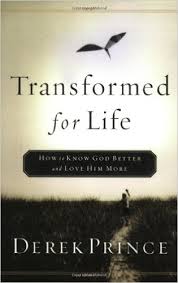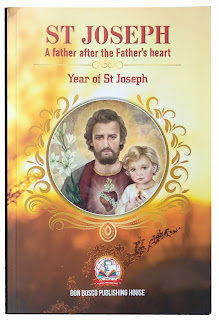Transformed for Life (Book Review)
Derek Prince, Transformed
for Life, USA: Chosen Books, 2005, ISBN 0-8007-9307-2, price not mentioned,
pp. 223.
The author is a well-educated academician and an ex-military
man. While still in service he began to read and study the Bible and
experienced a conversion. Since then he devoted himself to studying and
teaching the Bible. He is the author of over 50 books and about 600 audio and
video teaching cassettes, many of which have been translated and published in
more than sixty languages. He also hosted a daily radio program Keys to Successful Living which was
translated into a dozen languages. All this qualifies him as an authority
figure and a significant voice in matters concerning the Bible.
 The author in the preface mentions that “The messages compiled
in this volume are some of the most life-changing and practical that God has
given me. Together they represent a powerful look at the transforming power of
God as Father, Deliverer and Healer.” The aim of the book is clear from the
title and from the author’s words – transformation. How effective is the book?
I can speak for myself; I didn’t find it very transformative although it helped
me get a new perspective on certain things. The book has six chapter and 4
appendices. Each chapter deals with a different issue and has little or no
contiguity with the previous chapter.
The author in the preface mentions that “The messages compiled
in this volume are some of the most life-changing and practical that God has
given me. Together they represent a powerful look at the transforming power of
God as Father, Deliverer and Healer.” The aim of the book is clear from the
title and from the author’s words – transformation. How effective is the book?
I can speak for myself; I didn’t find it very transformative although it helped
me get a new perspective on certain things. The book has six chapter and 4
appendices. Each chapter deals with a different issue and has little or no
contiguity with the previous chapter.
Chapter one talks about God’s love, describing it as Extravagant. Using the parables of ‘the
treasure in the field’ and ‘the pearl of great price’, the author demonstrates
the extravagant nature of God’s love besides providing a few insights into the
nature of that love. The next three sub-chapters are about the Jesus’ sacrifice
as a tangible sign of God’s love, the gifts and graces showered on us and how
we ought to reciprocate this kind of love. Here, we see a nice flow of the
topics and their culmination in a practical outcome.
Chapter two talks of the ‘Divine Exchange’ that God has made
with humanity. Under it, the author discusses the aspects of the exchange,
which are Forgiveness and Healing, Righteousness, Life, Abundance Glory and
Acceptance, and Blessing. Jesus took upon himself every evil consequence that
the sin of humanity demanded so that we might receive what is good. This
appears simple but it is stupendous if you consider it. As in the previous
chapter, this chapter too concludes with some practical ways of living out the
Divine Exchange. The essential elements of this exchange are summarized in a
line so that it effectively reminds the reader of the key points. This chapter
is a very insightful one and I found it immensely useful for meditation.
Chapter three is devoted to the Holy Spirit. It explores His
nature, role and characteristics as revealed in scripture. The chapter
concludes with a discussion on the gifts and fruits of the Holy Spirit. The
author has presented the Holy Spirit simply and clearly. His explanations can
clarify doubts, questions and confusions that may be swirling in the reader’s
mind.
The fourth chapter deals with the theme ‘Disappointment’. Drawing
excellent insights from the experience of the Israelites at the bitter pool of
Marah, the author gives us lovely insight to help us deal with disappointments.
If I may summarize the chapter in a few words; all of us will face testing at
some point of the other. What is important is not whether or not we will face
it but how we respond to it.
Secondly, we realize that we cannot always do it ourselves. We require God and
He has the power to heal and save us. Finally, there can be no resurrection
without death and so don’t get caught up in your disappointment. God is wants
to reveal something to you. Open your eyes and ears to receive His message.
Chapter five is entitled ‘Fatherhood’ and is a
well-developed one. It deals with human life and experience, and brings out the
Divine dimension of fatherhood with surprising lucidity. Fatherhood is an
important theme in the Bible. The Fatherhood of God has a close resemblance to
the fatherhood of man. It is a source of identity, security and self-worth. He
goes on to explain the threefold ministries of the father inspired by Jesus:
Prophet, Priest and King. As a prophet the father must represent God to his
family. As Priest he must fulfill the role of intercessor and as King he must
take charge as head of his family.
The author makes a logical conclusion that the human father
represents God from the premise that God’s character and nature is that of
Father. Therefore, good fatherhood can be likened to Godliness. A feminist
criticism of this chapter would be that it only talks of man and fatherhood,
leaving out any mention of woman and motherhood except in subjection to man.
The author hasn’t mentioned the motherhood of God and has consequently left out
any explanation on the divinity inherent in motherhood.
The final chapter talks about curses and blessings. The
author begins by describing their theological significance and then moves on to
examining their causes, symptoms and treatment. His discussion on curses is
quite elaborate but I didn’t find it either appealing or agreeable. Despite the
examples he has cited, I am inclined to think otherwise on the matter. The
author’s dealing with the subject is very pastoral and hints at being a how-to
type of guide. The appendices contain help for making the transition from curse
to blessing.
The book is written in simple style and language. The
chapters are short and the brevity aids reflection. I think the book will be
appealing to people looking for something to assist their growth in the
Christian life. I would suggest however that if Catholics take up the book,
they refer to a knowledgeable person or priest for clarification and
explanation. The authors ideas although attractive don’t always go along
perfectly with Catholic belief. The book provides a refreshing view of God and
life and sets the reader along the path to freedom and fullness.



Comments
Post a Comment